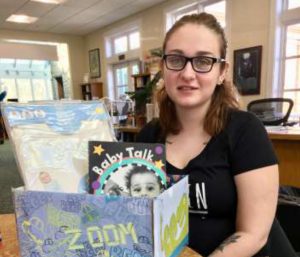2018 Annual Report
University of Maine Cooperative Extension Knox & Lincoln Counties

Putting university research to work in homes, businesses, farms and communities for over 100 years.
The University of Maine is an equal opportunity/affirmative action institution.
Download a print-friendly copy of the 2018 Annual Report (PDF).
Table of Contents
- Knox-Lincoln County Extension Association
- UMaine Extension Knox-Lincoln Counties Staff
- University of Maine Cooperative Extension seeks volunteers to serve on the Knox-Lincoln Counties Executive Committee
- President’s Message
- UMaine Extension Knox-Lincoln Counties Financial Resources
- 4-H Youth Development
- Parent Education
- Home Horticulture
- Commercial Agriculture
- Climate Change
- Alliance for Maine’s Marine Economy
- The County Extension Act
Knox-Lincoln County Extension Association
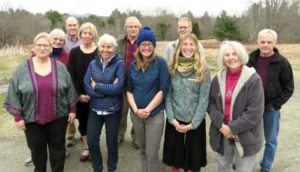
Executive Committee
- Linda Bonin, Co-President
- Scott Porter, Co-President
- Aaron Englander, Secretary
- Jack Green, Treasurer
- Frank Braun
- Craig Currie
- Wendy Roberts
- Gail Varga
UMaine Extension Knox-Lincoln Counties
377 Manktown Road
Waldoboro, ME 04572-5815
207.832.0343 or 800.244.2104 (in Maine)
Fax: 207.832.0377
extension.knoxlincoln@maine.edu
UMaine Extension Knox-Lincoln Counties Staff
Extension Educators
- Mark Hutchinson
- Esperanza Stancioff
Professionals
- Marylou Cook
- Jennifer Doherty
- Heather Elowe
- Gretchen Gee
- Ruth Griffin
- Kathryn Jensen
- Keri Kaczor
- Rebecca Koller
- Brooke Sanborn
- Claudia Williamson
Community Education Assistants
- Cindy Rogers
- Liz Stanley
Administrative Specialists
- Pamela Doherty
- Cindi Staples
University of Maine Cooperative Extension seeks volunteers to serve on the Knox-Lincoln Counties Executive Committee
UMaine Extension can only be successful with the help of county residents serving on the Executive Committee. Board members provide oversight and support to staff, as well as help promoting programs.
Knox-Lincoln Extension is one of the most active in the state providing a broad range of programs: 4-H youth development, farm-to-school programs educating kids on healthy food choices, assistance to commercial farmers and home gardeners, support for fishermen facing impacts due to warming temperatures in the Gulf of Maine, and in-home education for new parents.
Executive Committee members are asked to attend four two-hour meetings a year focusing on county programming, building maintenance, and finances. Members can certainly follow their interests and become more involved in any of the county programs.
If you’re interested in UMaine Extension Programs and giving back to your community, serving on the Executive Committee is a great place to be! For more information, please contact Esperanza Stancioff at 207.832.0343 or 800.244.2104 (in Maine) or at esp@maine.edu.
President’s Message
Our Knox-Lincoln County Cooperative Extension has had a busy and very productive year. The residents of our two counties receive tremendous research-based education and support, including youth in our 4-H programs, parents in our parent education program, farmers and gardeners in our home horticulture and commercial agriculture programs, as well as our marine and coastal communities through our climate change programs and initiatives. We are very fortunate to have the resources and knowledge of educators, professionals, and volunteers with many years of combined experience and education. Seeing as this is a community-based organization, I would like to thank all of the volunteers that provide extensive support to Cooperative Extension.
The University of Maine Cooperative Extension is a partnership between the University and the residents of Maine. Our office covers our two counties, and we provide housing for Extension, as well as the administrative support team’s salaries. The University provides funding for the educators and other staff. The Knox-Lincoln Counties Extension Association’s Executive Committee (EC) is a group of volunteers that take on a variety of roles in providing support to Extension. From providing the budget proposals to the counties, to maintaining the Extension office building, the EC is an integral part of making sure that the relationship between these professionals and the community continues to thrive.
The EC is always looking for new members who are interested in helping to serve the community and these pivotal programs provided by Extension. Many hands make light work, and it is a minimal time commitment for such a large benefit to our counties. I would encourage anyone who is interested to reach out to a committee member or to stop by the Extension Office.
Please enjoy the report, and we hope to hear from you soon!
— Scott Porter, KLCEA Executive Committee President
UMaine Extension Knox-Lincoln Counties Financial Resources
The graph below illustrates the financial resources for programs offered, supported and managed from the Knox & Lincoln Counties office. Each year, Knox and Lincoln Counties tax dollars support UMaine Extension with physical office space, support staff salaries, office supplies, equipment and programming expenses.
As a unique partnership among federal, state and county governments, UMaine Extension uses funding from Maine counties and the University to match and leverage support from the United States Department of Agriculture, other federal grantors, state agencies and private foundations. Each UMaine Extension county office is also part of a statewide organization and the national Extension system.
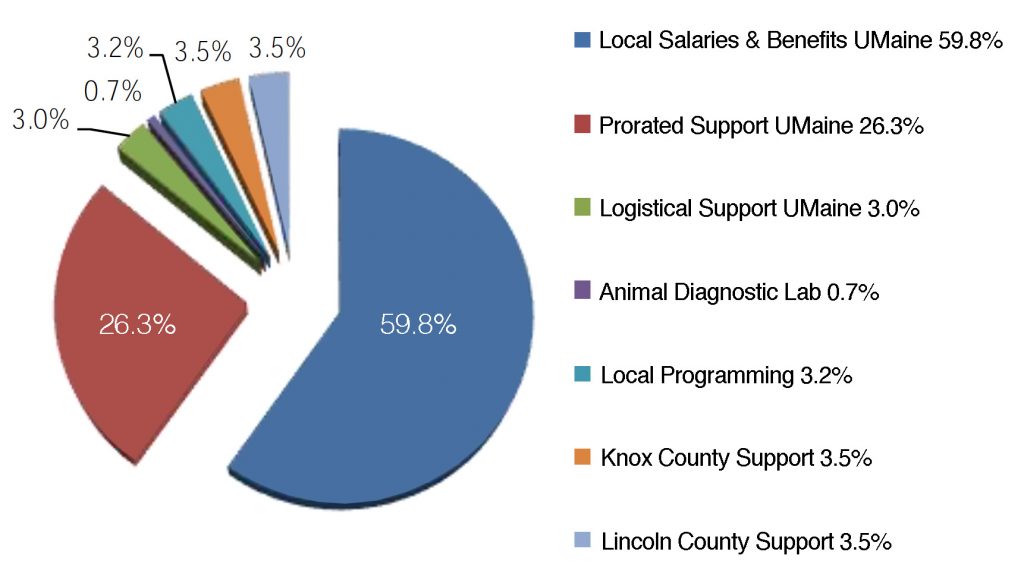
4-H Youth Development
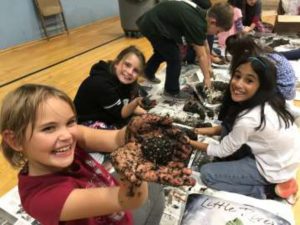
- Served 585 youth ages 5-18.
- Served 423 youth in School Enrichment programs, 53 youth in Short Term Special Interest (SPIN Clubs) at Prescott Memorial School, Great Salt Bay School via CLC YMCA, and Morris Farm/Wiscasset Community Center.
- In-school programs at Vinalhaven School — gardening, composting, water testing.
- Programs at Rockland Library, Gibbs Library in Washington, and Vose Library in Union.
- 1,530 visitors at the 4-H Farm to Fair Exhibit at Union Fair, highest number of guests served to date.
- 6 county 4-H Clubs, 95 youth members and 32 adult volunteers.
- Partnerships with CLC YMCA, Morris Farm, Wiscasset Community Center, Gibbs Library, Rockland Library, Vose Library, Vinalhaven School, Prescott Memorial School, and Maine Coast Heritage Trust.
Information: kathryn.a.jensen@maine.edu
Parent Education
Maine Families Home Visiting Program
- 7 Parent Educators with a combined total of 88.5 years of experience offered the Maine Families Home Visiting Program to local families who were pregnant or had a new baby at home.
- Utilizing the evidence-based Parents As Teachers™ Model, our team provided research based information and caring support to fit each family’s needs and concerns, supporting parents in their role as their child’s first and most important teacher.
- 200 families were served in Knox, Lincoln, and Sagadahoc Counties.
- 1,947 home visits were provided.
- 12 group connections were offered in the community.
- 100% of families who completed our annual parent survey reported Maine Families helped them understand their child’s growth and development, and 97% feel better about their parenting.
Information: jennifer.d.doherty@maine.edu
Home Horticulture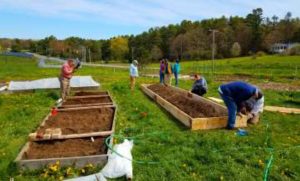
The Master Gardener Volunteer Program
- 60 hours of training in the art & science of horticulture.
- Participants volunteer on projects addressing food security & environmentally sustainable horticulture.
Horticulture
- Helping home, school & community gardeners with growing questions and pest, disease and invasive species management.
Resources
- UMaine Extension’s Garden & Yard website
- Maine Harvest for Hunger
- Maine School Garden Network
- Maine YardScaping
Information: elizabeth.stanley@maine.edu
Commercial Agriculture
 UMaine Extension is an international leader in Carcass Management Research and Education. It is the only USDA:APHIS Composting Subject Matter Expert certifying program in the United States.
UMaine Extension is an international leader in Carcass Management Research and Education. It is the only USDA:APHIS Composting Subject Matter Expert certifying program in the United States.
UMaine Extension works with growers to create sustainable business plans, develop new markets, and value added products.
UMaine Extension provides horticulture technical training to custodians at the Maine State Prison.
In 2018:
- Participants raised over 13,000 lbs. of food, used in the prison food service.
- Over 1,300 lbs. was donated to local food banks.
- Participants also designed and implemented research on compost application rates in raised bed systems.
This is a unique way to engage and further educate participants in sustainable agriculture.
Information: mhutch@maine.edu
Climate Change
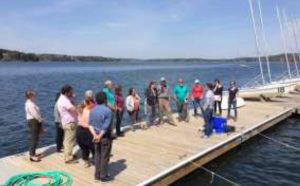 Through the NOAA funded project “A Strategy for Ocean and Coastal Acidification (OCA) Education and Citizen Science Monitoring in the Northeast,” we and project partners in the Northeast hosted 39 water quality groups to provide hands-on monitoring training in CT, MA, and ME. We developed two online webinars: OCA Citizen Science Monitoring Webinars and Acidification in the Gulf of Maine (YouTube video). This outreach and education effort linked coastal acidification with climate change and coastal watershed ecology, incorporating OCA monitoring into their current projects, and a blitz monitoring event with 50 groups planned for Summer 2019.
Through the NOAA funded project “A Strategy for Ocean and Coastal Acidification (OCA) Education and Citizen Science Monitoring in the Northeast,” we and project partners in the Northeast hosted 39 water quality groups to provide hands-on monitoring training in CT, MA, and ME. We developed two online webinars: OCA Citizen Science Monitoring Webinars and Acidification in the Gulf of Maine (YouTube video). This outreach and education effort linked coastal acidification with climate change and coastal watershed ecology, incorporating OCA monitoring into their current projects, and a blitz monitoring event with 50 groups planned for Summer 2019.
Maine Ocean and Coastal Acidification (MOCA) Partnership
The MOCA Partnership was formed in 2016 as an outgrowth from the Maine Ocean Acidification Commission, which developed recommendations to protect Maine’s marine resources from OA impacts. In November 2018, MOCA held a meeting with 20 legislators, state and federal agency staff and other stakeholders to discuss the future of MOCA and next steps for legislation in Maine. For resources, notes, and videos: MOCA website.
Initiated in 2010, Signs of the Seasons (SOS) is a citizen science program that engages citizens of all ages in observing and recording the seasonal timing of common plants and animals throughout 15 counties in ME. SOS provides science engagement for organizations and individuals while also providing valuable data to partner researchers. In 2018, SOS increased its participation in research efforts, developed new tools for volunteer observers’ engagement, implemented an evaluation survey, wrote a comprehensive peer-reviewed journal article in ME Policy Review, and presented at the National Phenology Network’s 10th Anniversary Conference at AZ State University.
Information: esp@maine.edu
Alliance for Maine’s Marine Economy
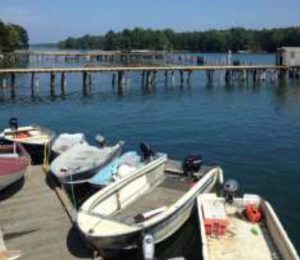 A responsive network of more than 20 Maine-based companies, organizations, and individuals, the Alliance for Maine’s Marine Economy is committed to a vibrant marine economy. Founded in 2016, the Alliance is coordinated by Maine Sea Grant, and fiscally managed by Maine Technology Institute. So far, 7 million dollars in voter-approved funding (Marine Economy and Jobs Bond) has been enhanced by more than 20 million, supporting 17 innovative projects from Saco to Machiasport.
A responsive network of more than 20 Maine-based companies, organizations, and individuals, the Alliance for Maine’s Marine Economy is committed to a vibrant marine economy. Founded in 2016, the Alliance is coordinated by Maine Sea Grant, and fiscally managed by Maine Technology Institute. So far, 7 million dollars in voter-approved funding (Marine Economy and Jobs Bond) has been enhanced by more than 20 million, supporting 17 innovative projects from Saco to Machiasport.
Six Alliance projects in Knox and Lincoln Counties
- Improvements to the waterfront infrastructure at UMaine’s Darling Marine Center (Walpole).
- State-of-the-art oyster facility at Mook Sea Farm (Walpole).
- Submersible mussel raft technology for Pemaquid Mussel Farms (Damariscotta).
- Instrumentation to support seaweed growers at Bigelow Laboratory (Boothbay Harbor).
- Infrastructure improvements at Community Shellfish, (Bremen).
- Japanese equipment to grow scallops at the Maine Aquaculture Cooperative (Tenant’s Harbor).
Other Alliance activities include gatherings to conduct business and hear industry perspectives, forums to share information and lessons learned from the investments, industry field days, and projects that operationalize the vision of the Alliance.
Information: keri.kaczor@maine.edu
The County Extension Act
The County Extension Act explains the role of county government in funding local Extension offices.
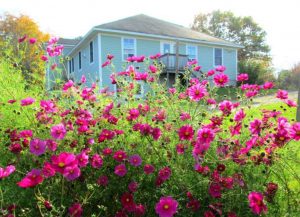
Cooperative Extension work shall consist of the giving of practical demonstrations in agriculture and natural resources, youth development, and home economics and community life and imparting information on those subjects through field demonstrations, publications and otherwise. For the purpose of carrying out this chapter, there may be created in each county or combination of two counties within the State an organization known as a “county extension association,” and its services available to all residents of a county. The county extension is viewed as a unique and important educational program of county government. The executive committee of each county extension association shall prepare an annual budget as requested, showing in detail its estimate of the amount of money to be expended under this chapter within the county or counties for the fiscal year. The executive committee shall submit to the board of county commissioners on a date requested by the county commissioners, and the county commissioners may, if they deem it justifiable, adopt an appropriate budget for the county extension program and levy a tax therefore. The amount thus raised by direct taxation within any county or combination of counties for the purposes of this chapter shall be used for the salaries of clerks, provision of office space, supplies, equipment, postage, telephone, a contribution toward the salaries of county educators and such other expenses as necessary to maintain an effective county extension program.1
1Excerpted from Title 7, Chapter 7 of the Maine Revised Statutes, §191–§195.
University of Maine Cooperative Extension’s successful educational programs result from a federal, state and county government partnership. Since 1919, when the Maine Legislature passed the County Extension Act, the University of Maine has been in all Maine communities with a county office whose operations are funded by county government. Our educational programs anticipate and respond to local and state needs and issues. We also communicate those issues and opportunities to UMaine faculty to influence their research and development plans.
©2019
The University of Maine Cooperative Extension Knox-Lincoln Counties office is an EEO/AA employer, and does not discriminate on the grounds of race, color, religion, sex, sexual orientation, transgender status, gender expression, national origin, citizenship status, age, disability, genetic information or veteran’s status in employment, education, and all other programs and activities. The following person has been designated to handle inquiries regarding non-discrimination policies: Director of Equal Opportunity, 101 North Stevens Hall, University of Maine, Orono, ME 04469-5754, 207.581.1226, TTY 711 (Maine Relay System).

